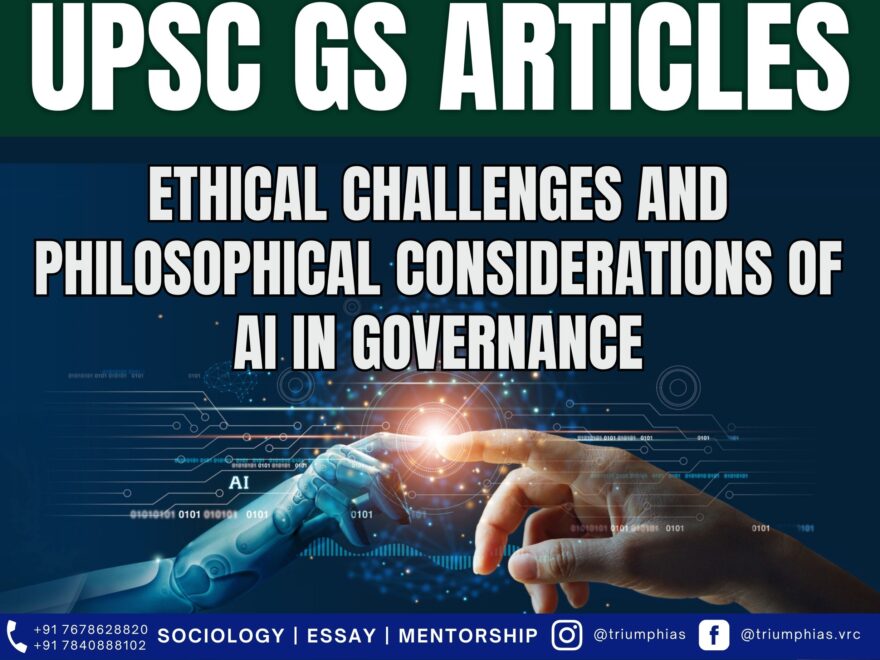Ethical Implications of AI
(Relevant for General Studies Paper Prelims/Mains)

Ethical Implications of AI
In an evolving landscape, machines and Artificial Intelligence (AI) are playing an ever-growing role in aiding human decision-making, especially within governance realms. As a result, numerous nations are enacting regulations to govern the deployment of AI. Government bodies and policy developers are harnessing AI-driven tools to dissect intricate patterns, predict forthcoming scenarios, and offer more knowledgeable suggestions.
Nonetheless, the integration of AI into decision-making processes presents its own set of challenges. AI has the potential to inherit biases from the data it is trained on or the perspectives of its creators. This can lead to unjust outcomes, posing a substantial hurdle in effectively integrating AI into governance practices.
Relation of AI to Certain Philosophical Ideas
Kantian Ethical Philosophy: Immanuel Kant’s ethical philosophy centers around three fundamental principles:
- Autonomy (the capacity to make independent decisions)
- Rationality (employing logic and reason in decision-making)
- Moral duty (adhering to ethical obligations)
- Application to AI in Governance: Entrusting AI systems with decision-making roles poses the risk of undermining nuanced moral reasoning. Allowing machines to make choices instead of humans could potentially weaken the core tenets of Kantian ethics.
- Bounded Ethicality: In 2022, two researchers examined bounded ethicality using Delphi, a prototype for simulating human moral judgments. They found that machines, similar to Delphi, might exhibit unethical behavior if the context separates ethics from the action itself. This highlights that machine-based bounded ethicality resembles how humans occasionally act against their own morals without feeling remorse, often employing justifications.
- Parallel with Asimov’s ‘Three Laws of Robotics’: Asimov’s laws were formulated to guide robots toward ethical behavior. However, in Asimov’s fictional scenarios, these laws frequently led to unforeseen and contradictory outcomes, showcasing the intricate nature of ethical decision-making even in machines designed to act ethically.
- The Intersection of Kant and Asimov: Kant’s emphasis on rational moral agency and Asimov’s fictional exploration of ethical guidelines for robots are intertwined. This fusion serves to illustrate the ethical quandaries and intricacies that emerge when human responsibilities and functions are transferred to artificial entities.
Ethical Challenges of AI
- Job Displacement and Socioeconomic Impact: The implementation of AI-driven automation has the potential to displace jobs within specific sectors. The resulting socioeconomic consequences, encompassing unemployment and income inequality, present ethical inquiries regarding the roles of governments and organizations in addressing these aftermaths.
- Threat to Moral Reasoning: Delegating decisions that were traditionally within the human domain to algorithms and AI carries the risk of compromising the capacity for moral reasoning. This suggests that overreliance on AI could weaken human capabilities for thoughtful ethical contemplation.
- Challenges of Codifying Ethics: The endeavor to translate intricate ethical principles into explicit guidelines for robots or AI-assisted governmental judgments is acknowledged as a formidable task. Human morality is intricate, making the adaptation of these intricate concepts into computer instructions a complex undertaking.
- Lack of Accountability & Transparency: Attributing accountability in instances of AI system errors can be intricate, especially when intricate algorithms and decision-making processes are involved. The inner workings of numerous AI systems often remain opaque, creating challenges in comprehending the decision-making mechanisms. This opacity can breed distrust and skepticism among users.
- Informed Consent: AI systems can gather and analyze personal data without the awareness or agreement of the individuals concerned. This gives rise to concerns regarding informed consent and the safeguarding of privacy rights.
Presently, numerous machine-generated predictions play a role in informing decisions, yet ultimate authority rests with humans. As time progresses, there’s a possibility that machines could assume responsibility for straightforward decisions within government processes. However, the prospect of a machine-driven decision proving erroneous or ethically problematic raises complex queries about accountability. Is it the AI system itself, its creator, or the individual who utilized its data who should be held responsible?. These intricate questions are on the horizon for society to grapple with. Implanting ethics into machines presents challenges, and a cautious approach is imperative for all stakeholders as we move ahead.
To master these intricacies and fare well in the Sociology Optional Syllabus, aspiring sociologists might benefit from guidance by the Best Sociology Optional Teacher and participation in the Best Sociology Optional Coaching. These avenues provide comprehensive assistance, ensuring a solid understanding of sociology’s diverse methodologies and techniques.
Ethical Implications, Artificial Intelligence, AI in Governance, Kantian Ethical Philosophy, Job Displacement, Moral Reasoning, Codifying Ethics, Accountability, Transparency, Informed Consent, Ethical Implications, Ethical Implications, Ethical Implication, Best Sociology Optional Coaching, Sociology Optional Syllabus.

Why Vikash Ranjan’s Classes for Sociology?
Proper guidance and assistance are required to learn the skill of interlinking current happenings with the conventional topics. VIKASH RANJAN SIR at TRIUMPH IAS guides students according to the Recent Trends of UPSC, making him the Best Sociology Teacher for Sociology Optional UPSC.
At Triumph IAS, the Best Sociology Optional Coaching platform, we not only provide the best study material and applied classes for Sociology for IAS but also conduct regular assignments and class tests to assess candidates’ writing skills and understanding of the subject.
Choose The Best Sociology Optional Teacher for IAS Preparation?
At the beginning of the journey for Civil Services Examination preparation, many students face a pivotal decision – selecting their optional subject. Questions such as “which optional subject is the best?” and “which optional subject is the most scoring?” frequently come to mind. Choosing the right optional subject, like choosing the best sociology optional teacher, is a subjective yet vital step that requires a thoughtful decision based on facts. A misstep in this crucial decision can indeed prove disastrous.
Ever since the exam pattern was revamped in 2013, the UPSC has eliminated the need for a second optional subject. Now, candidates have to choose only one optional subject for the UPSC Mains, which has two papers of 250 marks each. One of the compelling choices for many has been the sociology optional. However, it’s strongly advised to decide on your optional subject for mains well ahead of time to get sufficient time to complete the syllabus. After all, most students score similarly in General Studies Papers; it’s the score in the optional subject & essay that contributes significantly to the final selection.
“A sound strategy does not rely solely on the popular
Opinion of toppers or famous YouTubers cum teachers.”
It requires understanding one’s ability, interest, and the relevance of the subject, not just for the exam but also for life in general. Hence, when selecting the best sociology teacher, one must consider the usefulness of sociology optional coaching in General Studies, Essay, and Personality Test.
The choice of the optional subject should be based on objective criteria, such as the nature, scope, and size of the syllabus, uniformity and stability in the question pattern, relevance of the syllabic content in daily life in society, and the availability of study material and guidance. For example, choosing the best sociology optional coaching can ensure access to top-quality study materials and experienced teachers. Always remember, the approach of the UPSC optional subject differs from your academic studies of subjects. Therefore, before settling for sociology optional, you need to analyze the syllabus, previous years’ pattern, subject requirements (be it ideal, visionary, numerical, conceptual theoretical), and your comfort level with the subject.
This decision marks a critical point in your UPSC – CSE journey, potentially determining your success in a career in IAS/Civil Services. Therefore, it’s crucial to choose wisely, whether it’s the optional subject or the best sociology optional teacher. Always base your decision on accurate facts, and never let your emotional biases guide your choices. After all, the search for the best sociology optional coaching is about finding the perfect fit for your unique academic needs and aspirations.
To master these intricacies and fare well in the Sociology Optional Syllabus, aspiring sociologists might benefit from guidance by the Best Sociology Optional Teacher and participation in the Best Sociology Optional Coaching. These avenues provide comprehensive assistance, ensuring a solid understanding of sociology’s diverse methodologies and techniques. Sociology, Social theory, Best Sociology Optional Teacher, Best Sociology Optional Coaching, Sociology Optional Syllabus.
Best Sociology Optional Teacher, Sociology Syllabus, Sociology Optional, Sociology Optional Coaching, Best Sociology Optional Coaching, Best Sociology Teacher, Sociology Course, Sociology Teacher, Sociology Foundation, Sociology Foundation Course, Sociology Optional UPSC, Sociology for IAS,
Follow us :
🔎 https://www.instagram.com/triumphias
🔎https://www.youtube.com/c/TriumphIAS
https://t.me/VikashRanjanSociology
Find More Blogs
|
Scope of the subject and comparison with other social sciences |
|||
|
|
|
|
Modernity and social changes in Europe |


2 comments